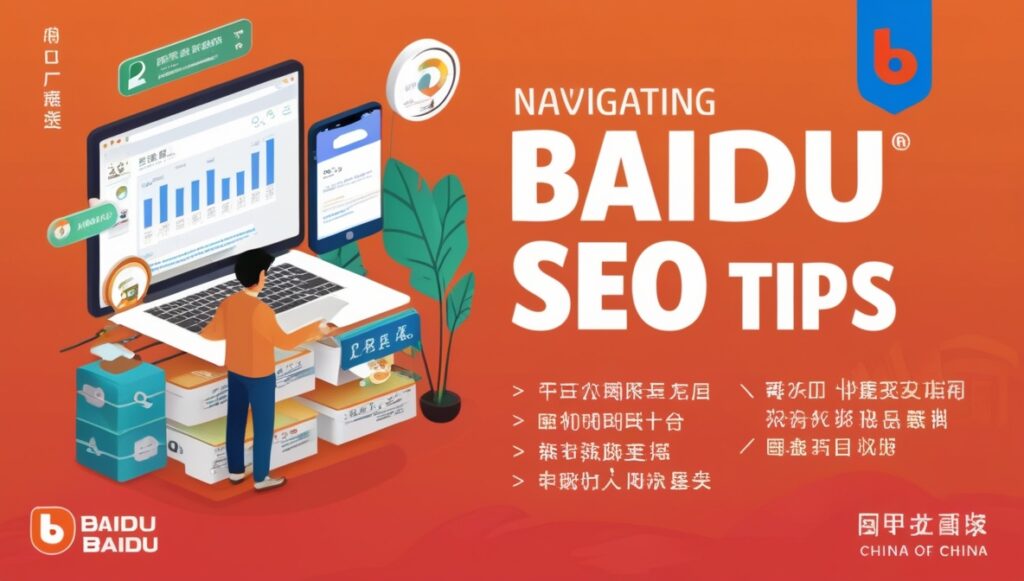
When it comes to search engine optimization (SEO) in China, Baidu is the name you need to know. With a commanding 70% share of the search engine market in China, Baidu is the undisputed leader, making it essential for businesses looking to expand into the Chinese digital space. Whether you’re a U.S.-based company or operating from Hong Kong, attracting Chinese consumers through Baidu requires a specialized SEO strategy. In this article, we’ll provide essential Baidu SEO tips that will help you boost your ranking and unlock success in the Chinese market.
Why Focus on Baidu SEO?

Before diving into the specific tips, it’s important to understand why Baidu SEO is so crucial for businesses targeting Chinese consumers. Unlike Google, which dominates most markets worldwide, Baidu is the preferred search engine in China. If you want your products and services to gain visibility among Chinese consumers, focusing on Baidu’s unique ecosystem is non-negotiable.
Here are the key reasons why Baidu SEO matters:
- Localized User Base: Baidu’s audience is almost entirely Chinese, making it a crucial platform for tapping into this vast market.
- Regulatory Compliance: China’s strict internet censorship policies (the Great Firewall) mean that many global platforms like Google, Facebook, and YouTube are inaccessible, driving local users to Baidu.
- Different Ranking Factors: Baidu uses algorithms that are significantly different from Google’s, with a strong emphasis on Chinese content, fast website speed within China, and adherence to government regulations.
With this context in mind, let’s explore the most effective Baidu SEO tips to improve your digital visibility and reach Chinese customers.
1. Create High-Quality, Chinese-Language Content
Perhaps the most fundamental Baidu SEO tip is to create high-quality content in Simplified Chinese. Baidu prioritizes Chinese-language content, so if your website is predominantly in English, it will struggle to rank. You should translate all website content into Simplified Chinese and ensure that it is culturally relevant and sensitive to local customs and trends.
Key Points:
- Use native-level Chinese translators to ensure accuracy.
- Optimize your content for readability, as Baidu’s algorithm values user-friendly, informative content.
- Regularly update your content to keep it fresh, as Baidu favors frequently updated websites.
Pro Tip:
To rank higher on Baidu, consider setting up a subdomain or an entirely separate Chinese website that caters specifically to Chinese users.
2. Host Your Website in China or Use a CDN
One of the biggest technical aspects of Baidu SEO is the speed at which your website loads. Since Baidu’s crawlers prioritize websites hosted within China, or at least sites with fast loading speeds within China, this is a critical step for ranking well.
Why is Hosting Important?
- Websites hosted outside of China often face delays due to the Great Firewall, making them less favorable for Baidu’s crawlers.
- Baidu gives priority to websites with faster load times, meaning slower sites are penalized in rankings.
Solution:
You can either host your website directly in China by obtaining a local Internet Content Provider (ICP) license or use a Content Delivery Network (CDN) that optimizes load speed for users within China. Popular CDNs such as Tencent Cloud or Alibaba Cloud can significantly improve load times for users in mainland China.
3. Obtain an ICP License
For companies seriously considering long-term growth in China, obtaining an ICP license is almost a requirement for ranking well on Baidu. The Chinese government mandates that websites hosted within China obtain an ICP license, which signals legitimacy and compliance with local regulations.
What You Need to Know:
- There are two types of ICP licenses: commercial and non-commercial. Businesses engaging in e-commerce or advertising will need the commercial ICP license.
- Without this license, your website will not be able to use a Chinese server, which significantly limits your Baidu ranking potential.
This is a more complex process but can be facilitated by working with a local partner or hosting provider familiar with the process.
4. Mobile Optimization is Essential
With over 1 billion mobile internet users in China, mobile optimization is crucial for your Baidu SEO strategy. Baidu places significant weight on mobile-friendly websites due to the large number of mobile users in China.
What to Focus On:
- Responsive Design: Ensure your website adapts seamlessly to different screen sizes.
- AMP (Accelerated Mobile Pages): Baidu supports a version of AMP known as MIP (Mobile Instant Pages). By implementing MIP, you can improve your site’s load time on mobile devices and boost your rankings.
Pro Tip:
Optimize your website for both iOS and Android devices, as these are the most popular mobile platforms in China.
5. Prioritize On-Page SEO for Baidu
On-page SEO for Baidu shares many similarities with Google, but there are some unique aspects to consider.
Key Factors to Focus On:
- Meta Tags: Ensure that your title tags, meta descriptions, and headers are all in Chinese and accurately reflect the content.
- Keyword Placement: Baidu tends to prioritize keywords in titles and meta descriptions more heavily than Google, so be sure to optimize accordingly.
- Internal Linking: Use internal links to help Baidu’s crawlers navigate your site more effectively.
While keyword stuffing is not recommended (as Baidu’s algorithm has grown more sophisticated), it’s important to integrate relevant keywords naturally throughout your content.
6. Build Quality Backlinks
Similar to Google, backlinks play a crucial role in Baidu SEO. However, Baidu places even greater emphasis on the quality of the backlinks rather than just the quantity.
Best Practices for Backlinking:
- Focus on acquiring links from high-authority Chinese websites.
- Avoid black-hat tactics like link farms or buying low-quality links, as Baidu’s algorithm penalizes this behavior.
Building a network of quality backlinks from Chinese sources signals to Baidu that your website is trustworthy and relevant, helping improve your rankings.
7. Content Censorship and Compliance
Unlike Google, Baidu operates under China’s stringent content censorship laws. Failure to comply with these regulations can result in your website being penalized or, in severe cases, blacklisted.
How to Stay Compliant:
- Avoid any content that touches on sensitive topics like politics, religion, or other subjects deemed inappropriate by the Chinese government.
- Stick to neutral, business-related, and informational content to ensure compliance.
Adhering to these guidelines will keep your website in good standing with Baidu’s policies and prevent penalties.
8. Use Baidu Webmaster Tools
Baidu provides its own set of webmaster tools (similar to Google Search Console), which are essential for monitoring your website’s performance.
Key Features:
- Submit Your Website for Indexing: Baidu’s crawlers may take longer to find new websites, so submitting your site directly can expedite this process.
- Monitor Traffic and Errors: The tool allows you to track your traffic sources, monitor errors, and optimize your site accordingly.
9. Optimize for Baidu’s Rich Media Search Results
Baidu is heavily focused on rich media, and incorporating images, videos, and other multimedia content can significantly boost your rankings.
Key Areas of Focus:
- Alt Text: Make sure all images have alt text in Chinese.
- Video Content: Baidu places a strong emphasis on video results, so consider uploading videos directly to Baidu Video or partnering with platforms like iQiyi (often called the “YouTube of China”).
- Interactive Features: Features like quizzes, polls, and downloadable content can also improve engagement and rankings.
10. Leverage Local SEO with Baidu Maps
If you have a physical presence in China, you should absolutely take advantage of Baidu Maps for local SEO. Registering your business on Baidu Maps ensures that local users can find you easily, boosting your visibility and credibility.
Action Steps:
- Claim and verify your business on Baidu Maps.
- Ensure your business information is accurate, including address, phone number, and hours of operation.
This is particularly valuable for local businesses and brick-and-mortar stores.
Conclusion

Navigating Baidu’s unique ecosystem can be challenging, especially for businesses outside of China. However, by following these Baidu SEO tips, you can significantly improve your rankings and visibility in the Chinese market. From hosting your site in China to optimizing for mobile and complying with local content regulations, success on Baidu requires a comprehensive and localized approach.
At Dust Digital Marketing Ltd., we specialize in helping businesses across the globe, including those in the USA, tap into the power of Baidu SEO. Whether you’re just getting started or looking to improve your current strategy, our experts are here to help you succeed in China’s vast digital marketplace. Reach out today to learn how we can elevate your SEO strategy for Baidu.
This article synthesizes key insights from leading resources to provide a comprehensive guide for anyone looking to improve their Baidu SEO strategy .

